Module 6 Hobbies Unit 2 Hobbies can make you grow as a person. 课件(55张ppt,内嵌音频)
文档属性
| 名称 | Module 6 Hobbies Unit 2 Hobbies can make you grow as a person. 课件(55张ppt,内嵌音频) |
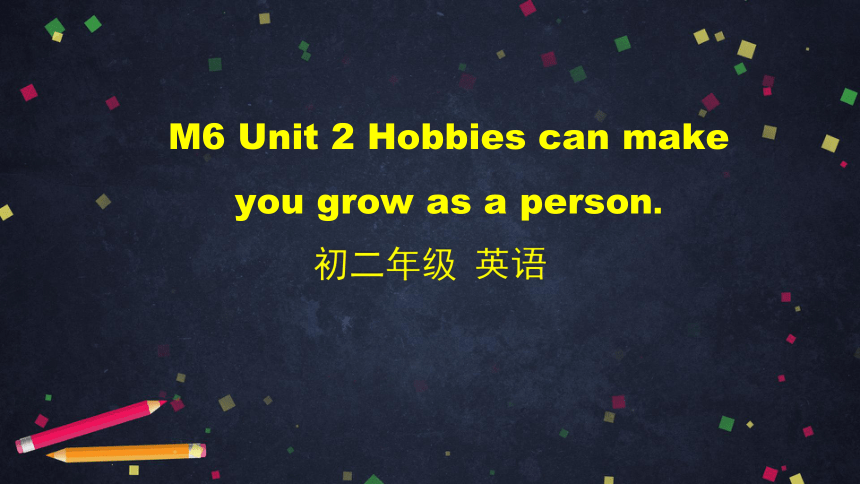
|
|
| 格式 | zip | ||
| 文件大小 | 11.9MB | ||
| 资源类型 | 教案 | ||
| 版本资源 | 外研版 | ||
| 科目 | 英语 | ||
| 更新时间 | 2020-06-04 00:00:00 | ||
图片预览



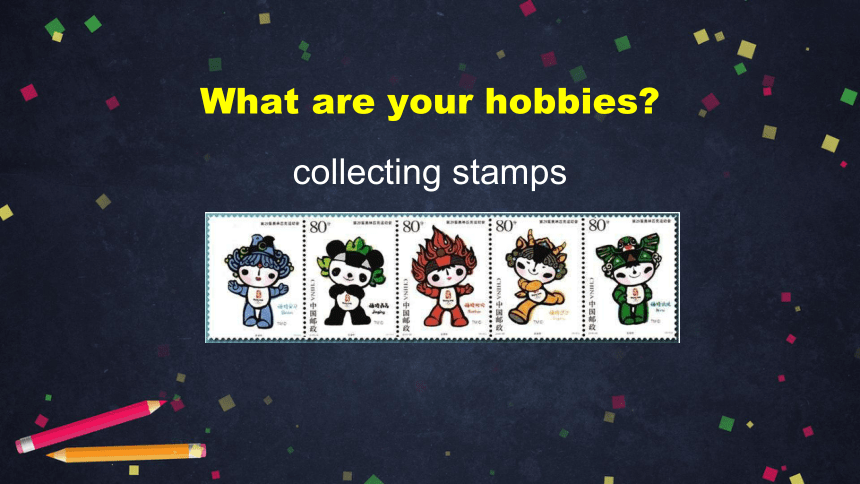
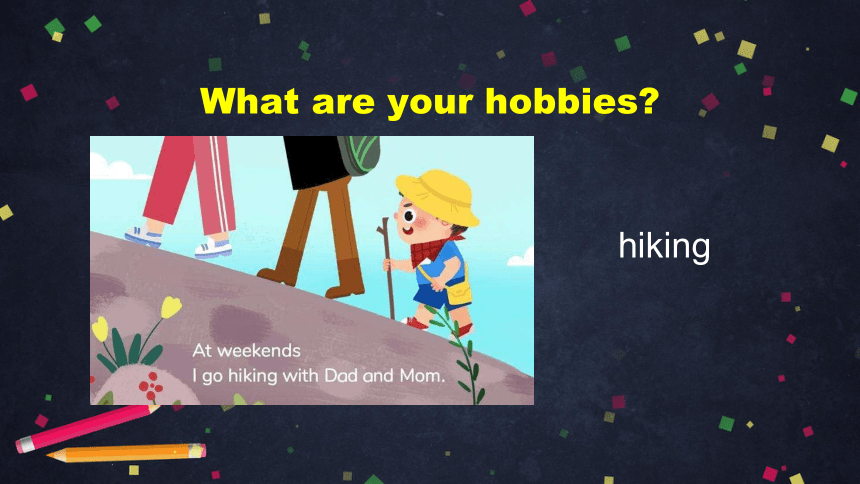

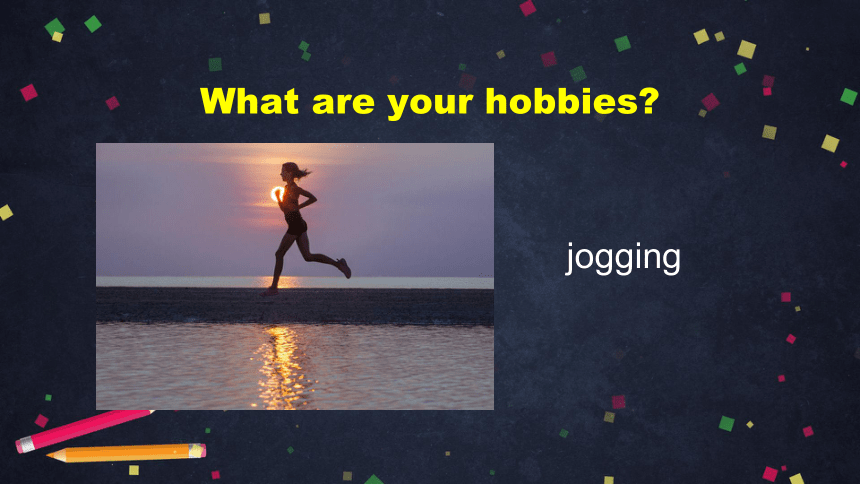

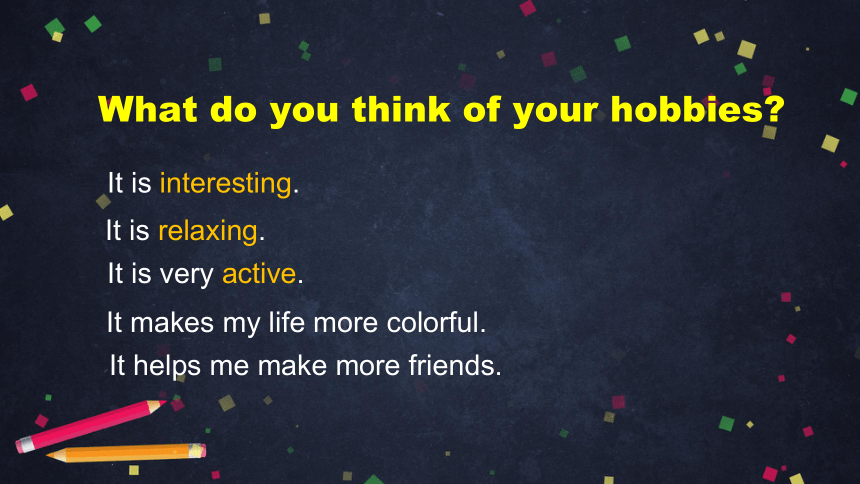
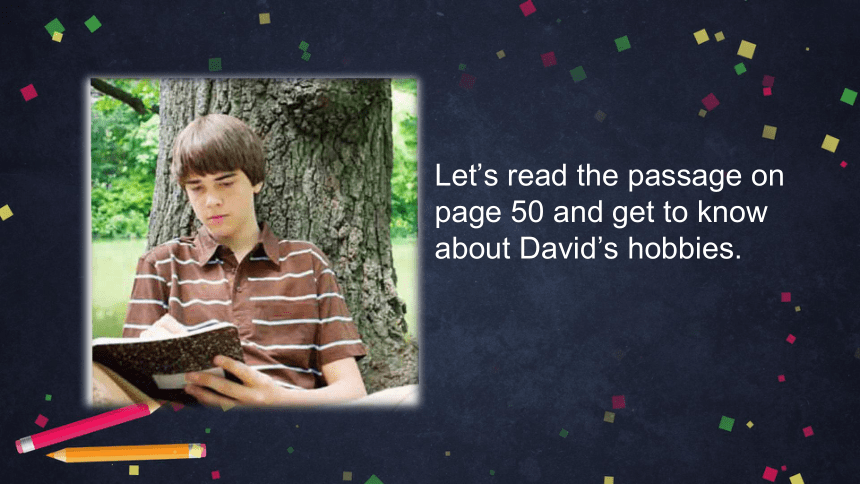
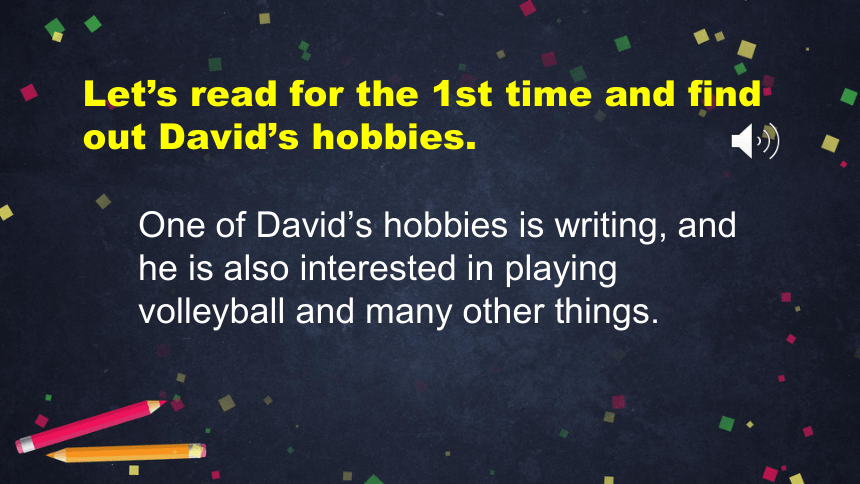
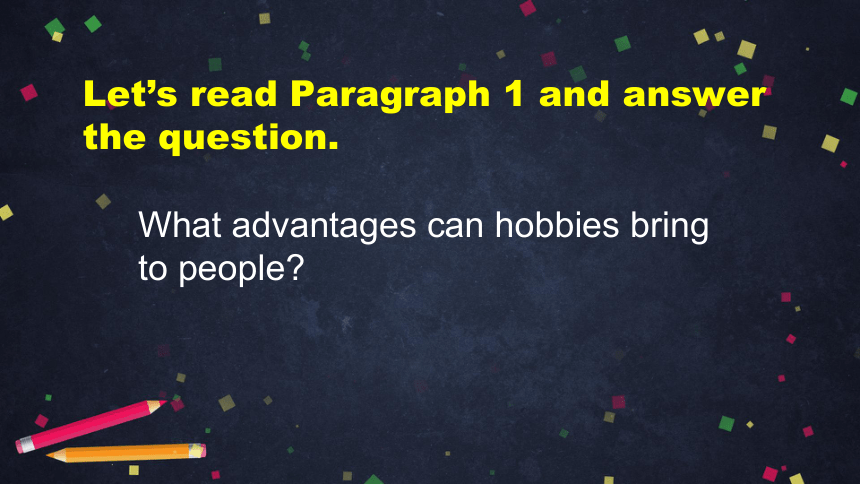
文档简介
(共55张PPT)
M6
Unit
2
Hobbies
can
make
you
grow
as
a
person.
初二年级
英语
What
are
your
hobbies?
dancing
climbing
painting
singing
looking
after
animals
writing
growing
vegetables
playing
volleyball
…
watching
movies
What
are
your
hobbies?
collecting
stamps
What
are
your
hobbies?
hiking
What
are
your
hobbies?
cycling
What
are
your
hobbies?
jogging
What
are
your
hobbies?
programming
What
are
your
hobbies?
What
do
you
think
of
your
hobbies?
It
is
interesting.
It
is
relaxing.
It
is
very
active.
It
makes
my
life
more
colorful.
It
helps
me
make
more
friends.
Let’s
read
the
passage
on
page
50
and
get
to
know
about
David’s
hobbies.
Let’s
read
for
the
1st
time
and
find
out
David’s
hobbies.
One
of
David’s
hobbies
is
writing,
and
he
is
also
interested
in
playing
volleyball
and
many
other
things.
Let’s
read
Paragraph
1
and
answer
the
question.
What
advantages
can
hobbies
bring
to
people?
1
Many
students
have
hobbies,
such
as
reading,
painting,
growing
vegetables
and
looking
after
animals.
Some
hobbies
are
relaxing,
and
others
are
active.
Hobbies
can
make
you
grow
as
a
person,
develop
your
interests
and
help
you
learn
new
skills.
1
Many
students
have
hobbies,
such
as
reading,
painting,
growing
vegetables
and
looking
after
animals.
Some
hobbies
are
relaxing,
and
others
are
active.
Hobbies
can
make
you
grow
as
a
person,
develop
your
interests
and
help
you
learn
new
skills.
What
advantages
can
hobbies
bring
to
people?
Hobbies
can
make
you
grow
as
a
person,
develop
your
interests
and
help
you
learn
new
skills.
Many
students
have
hobbies,
such
as
reading,
painting,
growing
vegetables
and
looking
after
animals.
Some
hobbies
are
relaxing,
and
others
are
active.
What
are
David’s
hobbies?
How
did
David
develop
his
hobbies?
Hobbies
can
make
you
grow
as
a
person,
develop
your
interests
and
help
you
learn
new
skills.
How
have
David’s
hobbies
helped
him?
Let’s
read
Paragraph
2
to
find
out
the
answers.
1.
What
did
David
do
during
the
summer
of
2010?
2.
What
did
the
teacher
ask
them
to
do
in
the
writing
class?
2
David
Smith
is
a
student
and
one
of
his
hobbies
is
writing.
During
the
summer
of
2010,
he
spent
four
weeks
at
a
summer
camp.
As
well
as
the
usual
activities,
such
as
sailing
and
climbing,
there
was
a
writing
class.
“The
teacher
was
a
writer,
and
she
asked
us
to
talk
about
our
lives
and
tell
interesting
stories.
Then
she
encouraged
us
to
write
about
our
experiences
at
the
camp.”
2
David
Smith
is
a
student
and
one
of
his
hobbies
is
writing.
During
the
summer
of
2010,
he
spent
four
weeks
at
a
summer
camp.
As
well
as
the
usual
activities,
such
as
sailing
and
climbing,
there
was
a
writing
class.
“The
teacher
was
a
writer,
and
she
asked
us
to
talk
about
our
lives
and
tell
interesting
stories.
Then
she
encouraged
us
to
write
about
our
experiences
at
the
camp.”
Let’s
read
Paragraph
2
to
find
out
the
answers.
1.
What
did
he
do
during
the
summer
of
2010?
He
spent
four
weeks
in
a
summer
camp.
2.
What
did
the
teacher
ask
them
to
do
in
the
writing
class?
She
asked
them
to
talk
about
their
lives
and
tell
interesting
stories.
Then
she
encouraged
them
to
write
about
their
experiences
at
the
camp.
Let’s
read
Paragraph
2
to
find
out
the
answers.
1.
What
did
David
write
about?
2.
What
happened
after
he
wrote
the
story?
Let’s
read
Paragraph
3
to
find
out
the
answers.
3
Back
at
school,
David
wrote
a
story
about
the
life
of
a
sixteen-year-old
boy,
and
it
came
out
as
a
book
in
2012.
Many
young
people
love
his
book,
and
as
a
result,
David
has
become
a
successful
young
writer.
3
Back
at
school,
David
wrote
a
story
about
the
life
of
a
sixteen-year-old
boy,
and
it
came
out
in
2012.
Many
young
people
love
his
book,
and
as
a
result,
David
has
become
a
successful
young
writer.
Let’s
read
Paragraph
3
to
find
out
the
answers.
1.
What
did
David
write
about?
David
wrote
a
story
about
the
life
of
a
sixteen-
year-old
boy.
Let’s
read
Paragraph
3
to
find
out
the
answers.
2.
What
happened
after
he
wrote
the
story?
The
story
came
out
as
a
book
and
many
young
people
love
his
book,
and
as
a
result,
David
has
become
a
successful
young
writer.
What
has
David’s
hobby
brought
him?
Let’s
read
Paragraph
4
to
find
out
the
answer.
4
David
has
been
very
lucky
because
his
hobby
has
brought
him
pleasure
and
success.
But
writing
is
not
his
only
hobby.
He
is
also
interested
in
many
other
things.
“I
like
playing
volleyball
too,”
says
David.
“I
spend
some
of
my
free
time
playing
volleyball
for
my
school
team.
Maybe
I’ll
write
about
my
volleyball
team
in
my
future
books.”
4
David
has
been
very
lucky
because
his
hobby
has
brought
him
pleasure
and
success.
But
writing
is
not
his
only
hobby.
He
is
also
interested
in
many
other
things.
“I
like
playing
volleyball
too,”
says
David.
“I
spend
some
of
my
free
time
playing
volleyball
for
my
school
team.
Maybe
I’ll
write
about
my
volleyball
team
in
my
future
books.”
Let’s
read
the
Paragraph
4
and
answer
the
question.
What
has
David’s
hobby
brought
him?
His
hobby
has
brought
him
pleasure
and
success.
Will
David’s
new
books
be
successful?
In
my
opinion,
I
think
they
will.
Because
his
books
are
about
the
real
life
and
interesting
things
of
teenagers.
It
will
be
as
popular
as
his
last
book.
What’s
your
opinion?
Let’s
read
Para2-4
again
and
get
clearer
about
David’s
hobbies.
David’s
hobbies
Hobbies
can
make
us
grow
as
a
person,
develop
our
interests
and
help
us
learn
new
skills.
…
How
many
parts
can
we
divide
this
passage
into?
Paragraph
1
Paragraph
2
Paragraph
3
Paragraph
4
David’s
hobbies
A
brief
introduction
1.
David
has
been
very
lucky
because
his
hobby
has
brought
him
pleasure
and
success.
Language
focus
bring
somebody
something
bring
something
to
somebody
bring-brought-brought
e.g.
Don’t
forget
to
bring
Helen
a
present/gift.
Don’t
forget
to
bring
a
present/gift
to
Helen.
come
out
出版,发行;显露
e.g.
When
will
your
new
book
come
out?
At
last
the
truth
came
out!
come-came-come
Language
focus
2.
It
came
out
as
a
book
in
2012.
develop
v.
发展;成长
e.g.
This
course
can
help
you
develop
your
speaking
skills.
Tom
has
developed
into
a
strong
leader.
Language
focus
3.
Hobbies
can
make
you
grow
as
a
person,
develop
your
interests
and
help
you
learn
new
skills.
4.
I
spend
some
of
my
free
time
playing
volleyball
for
my
school
team.
spend
time
(in)
doing
sth.
spend
time
on
sth.
e.g.
I
spend
one
hour
(in)
reading
every
evening.
Julia
hasn’t
spent
enough
time
on
her
study.
Language
focus
spend-spent-spent
5.
Many
students
have
hobbies,
such
as
reading,
painting,
growing
vegetables
and
looking
after
animals.
such
as
例如
e.g.
I
enjoy
many
ball
games,
such
as
soccer
and
basketball.
There
are
various
animals
in
the
zoo,
such
as
monkeys
and
elephants.
Language
focus
6.
As
well
as
the
usual
activities,
such
as
sailing
and
climbing,
there
was
a
writing
class.
as
well
as
也,还,而且
e.g.
We
all
want
to
visit
Beijing
as
well
as
Shanghai.
He
enjoys
playing
football
as
well
as
watching
it.
He
gave
help
and
support
to
the
local
people,
as
well
as
raised
money
for
poor
children.
Language
focus
7.
Many
young
people
love
his
book,
and
as
a
result,
David
has
become
a
successful
young
writer.
as
a
result
因此,所以,结果是
e.g.
It
snowed
heavily,
and
as
a
result,
he
came
late.
He
worked
hard
at
his
study,
and
as
a
result,
he
passed
the
exam
easily.
Language
focus
He
became
blind,
as
a
result
of
an
accident.
activity
result
pleasure
skill
success
Let’s
read
and
review
the
words.
What
do
you
enjoy
doing?
What
new
have
you
learnt
through
your
hobbies?
activities
skills
Complete
the
sentences
with
the
correct
form
of
the
words
in
the
box.
activity
result
pleasure
skill
success
3.
Has
any
of
your
hobbies
brought
you
and
?
4.
Have
you
made
new
friends
as
a(n)
of
your
hobby?
pleasure
success
result
activity
result
pleasure
skill
success
Complete
the
sentences
with
the
correct
form
of
the
words
in
the
box.
How
can
we
write
about
others’
hobbies?
1.
What
are
his/her
hobbies?
2.
How
did
he/she
develop
his/her
hobbies?
3.
What
have
his/her
hobbies
brought
him/her?
enjoy
doing
like
doing
be
keen
on
Tony
is
also
interested
in
many
other
things,
such
as...
1.
What
are
his/her
hobbies?
One
of
Tony
hobbies
is
writing.
How
can
we
write
about
others’
hobbies?
During
the
summer
of
2018,
Tony
spent
four
weeks
on
an
extra-class
activity.
He
learnt
about
playing
football
and
practiced
together
with
his
teammates.
How
can
we
write
about
others’
hobbies?
2.
How
did
he/she
develop
his/her
hobbies?
grow
as
a
person
learn
new
skills
develop
interests
make
new
friends
…
3.
What
have
the
hobbies
brought
him/her
?
How
can
we
write
about
others’
hobbies?
climbing
dancing
playing
volleyball
looking
after
animals
writing
braver,
stronger,
more
careful
fitter,
more
graceful(优雅的)
heathier,
faster
kinder,
gentler,
more
patient
more
able
to
explain
ideas
and
feelings
helps/makes
…
…
Let’s
read
and
learn
something
from
the
example.
Different
people
keep
different
hobbies,
such
as
reading,
painting
and
writing.
Some
hobbies
are
active,
and
others
are
very
relaxing.
Hobbies
can
make
people
grow
as
a
better
person.
Tony’s
hobbies
Tony
is
my
brother.
He
is
interested
in
many
things.
He
especially
enjoys
playing
football
as
well
as
watching
it.
During
the
summer
of
2018,
he
spent
four
weeks
on
an
extra-class
activity.
He
learnt
about
playing
football
there
and
practiced
together
with
his
teammates.
They
have
won
many
prizes
in
the
recent
years,
and
as
a
result,
he
became
more
popular
at
school!
Playing
football
has
brought
Tony
a
strong
will
and
an
excellent
condition.
Besides,
Tony
has
become
more
and
more
confident.
Thanks
to
his
hobby,
he
has
been
developed
into
a
better
person.
Have
a
try!
Write
a
passage
to
introduce
your
family
members’
hobbies.
1.
What
are
his/her
hobbies?
2.
How
did
he/she
develop
his/her
hobbies?
3.
What
have
his/her
hobbies
brought
him/her?
Homework
1.
跟读课文录音。
2.
写一篇短文,介绍你家人的兴趣爱好。
M6
Unit
2
Hobbies
can
make
you
grow
as
a
person.
初二年级
英语
What
are
your
hobbies?
dancing
climbing
painting
singing
looking
after
animals
writing
growing
vegetables
playing
volleyball
…
watching
movies
What
are
your
hobbies?
collecting
stamps
What
are
your
hobbies?
hiking
What
are
your
hobbies?
cycling
What
are
your
hobbies?
jogging
What
are
your
hobbies?
programming
What
are
your
hobbies?
What
do
you
think
of
your
hobbies?
It
is
interesting.
It
is
relaxing.
It
is
very
active.
It
makes
my
life
more
colorful.
It
helps
me
make
more
friends.
Let’s
read
the
passage
on
page
50
and
get
to
know
about
David’s
hobbies.
Let’s
read
for
the
1st
time
and
find
out
David’s
hobbies.
One
of
David’s
hobbies
is
writing,
and
he
is
also
interested
in
playing
volleyball
and
many
other
things.
Let’s
read
Paragraph
1
and
answer
the
question.
What
advantages
can
hobbies
bring
to
people?
1
Many
students
have
hobbies,
such
as
reading,
painting,
growing
vegetables
and
looking
after
animals.
Some
hobbies
are
relaxing,
and
others
are
active.
Hobbies
can
make
you
grow
as
a
person,
develop
your
interests
and
help
you
learn
new
skills.
1
Many
students
have
hobbies,
such
as
reading,
painting,
growing
vegetables
and
looking
after
animals.
Some
hobbies
are
relaxing,
and
others
are
active.
Hobbies
can
make
you
grow
as
a
person,
develop
your
interests
and
help
you
learn
new
skills.
What
advantages
can
hobbies
bring
to
people?
Hobbies
can
make
you
grow
as
a
person,
develop
your
interests
and
help
you
learn
new
skills.
Many
students
have
hobbies,
such
as
reading,
painting,
growing
vegetables
and
looking
after
animals.
Some
hobbies
are
relaxing,
and
others
are
active.
What
are
David’s
hobbies?
How
did
David
develop
his
hobbies?
Hobbies
can
make
you
grow
as
a
person,
develop
your
interests
and
help
you
learn
new
skills.
How
have
David’s
hobbies
helped
him?
Let’s
read
Paragraph
2
to
find
out
the
answers.
1.
What
did
David
do
during
the
summer
of
2010?
2.
What
did
the
teacher
ask
them
to
do
in
the
writing
class?
2
David
Smith
is
a
student
and
one
of
his
hobbies
is
writing.
During
the
summer
of
2010,
he
spent
four
weeks
at
a
summer
camp.
As
well
as
the
usual
activities,
such
as
sailing
and
climbing,
there
was
a
writing
class.
“The
teacher
was
a
writer,
and
she
asked
us
to
talk
about
our
lives
and
tell
interesting
stories.
Then
she
encouraged
us
to
write
about
our
experiences
at
the
camp.”
2
David
Smith
is
a
student
and
one
of
his
hobbies
is
writing.
During
the
summer
of
2010,
he
spent
four
weeks
at
a
summer
camp.
As
well
as
the
usual
activities,
such
as
sailing
and
climbing,
there
was
a
writing
class.
“The
teacher
was
a
writer,
and
she
asked
us
to
talk
about
our
lives
and
tell
interesting
stories.
Then
she
encouraged
us
to
write
about
our
experiences
at
the
camp.”
Let’s
read
Paragraph
2
to
find
out
the
answers.
1.
What
did
he
do
during
the
summer
of
2010?
He
spent
four
weeks
in
a
summer
camp.
2.
What
did
the
teacher
ask
them
to
do
in
the
writing
class?
She
asked
them
to
talk
about
their
lives
and
tell
interesting
stories.
Then
she
encouraged
them
to
write
about
their
experiences
at
the
camp.
Let’s
read
Paragraph
2
to
find
out
the
answers.
1.
What
did
David
write
about?
2.
What
happened
after
he
wrote
the
story?
Let’s
read
Paragraph
3
to
find
out
the
answers.
3
Back
at
school,
David
wrote
a
story
about
the
life
of
a
sixteen-year-old
boy,
and
it
came
out
as
a
book
in
2012.
Many
young
people
love
his
book,
and
as
a
result,
David
has
become
a
successful
young
writer.
3
Back
at
school,
David
wrote
a
story
about
the
life
of
a
sixteen-year-old
boy,
and
it
came
out
in
2012.
Many
young
people
love
his
book,
and
as
a
result,
David
has
become
a
successful
young
writer.
Let’s
read
Paragraph
3
to
find
out
the
answers.
1.
What
did
David
write
about?
David
wrote
a
story
about
the
life
of
a
sixteen-
year-old
boy.
Let’s
read
Paragraph
3
to
find
out
the
answers.
2.
What
happened
after
he
wrote
the
story?
The
story
came
out
as
a
book
and
many
young
people
love
his
book,
and
as
a
result,
David
has
become
a
successful
young
writer.
What
has
David’s
hobby
brought
him?
Let’s
read
Paragraph
4
to
find
out
the
answer.
4
David
has
been
very
lucky
because
his
hobby
has
brought
him
pleasure
and
success.
But
writing
is
not
his
only
hobby.
He
is
also
interested
in
many
other
things.
“I
like
playing
volleyball
too,”
says
David.
“I
spend
some
of
my
free
time
playing
volleyball
for
my
school
team.
Maybe
I’ll
write
about
my
volleyball
team
in
my
future
books.”
4
David
has
been
very
lucky
because
his
hobby
has
brought
him
pleasure
and
success.
But
writing
is
not
his
only
hobby.
He
is
also
interested
in
many
other
things.
“I
like
playing
volleyball
too,”
says
David.
“I
spend
some
of
my
free
time
playing
volleyball
for
my
school
team.
Maybe
I’ll
write
about
my
volleyball
team
in
my
future
books.”
Let’s
read
the
Paragraph
4
and
answer
the
question.
What
has
David’s
hobby
brought
him?
His
hobby
has
brought
him
pleasure
and
success.
Will
David’s
new
books
be
successful?
In
my
opinion,
I
think
they
will.
Because
his
books
are
about
the
real
life
and
interesting
things
of
teenagers.
It
will
be
as
popular
as
his
last
book.
What’s
your
opinion?
Let’s
read
Para2-4
again
and
get
clearer
about
David’s
hobbies.
David’s
hobbies
Hobbies
can
make
us
grow
as
a
person,
develop
our
interests
and
help
us
learn
new
skills.
…
How
many
parts
can
we
divide
this
passage
into?
Paragraph
1
Paragraph
2
Paragraph
3
Paragraph
4
David’s
hobbies
A
brief
introduction
1.
David
has
been
very
lucky
because
his
hobby
has
brought
him
pleasure
and
success.
Language
focus
bring
somebody
something
bring
something
to
somebody
bring-brought-brought
e.g.
Don’t
forget
to
bring
Helen
a
present/gift.
Don’t
forget
to
bring
a
present/gift
to
Helen.
come
out
出版,发行;显露
e.g.
When
will
your
new
book
come
out?
At
last
the
truth
came
out!
come-came-come
Language
focus
2.
It
came
out
as
a
book
in
2012.
develop
v.
发展;成长
e.g.
This
course
can
help
you
develop
your
speaking
skills.
Tom
has
developed
into
a
strong
leader.
Language
focus
3.
Hobbies
can
make
you
grow
as
a
person,
develop
your
interests
and
help
you
learn
new
skills.
4.
I
spend
some
of
my
free
time
playing
volleyball
for
my
school
team.
spend
time
(in)
doing
sth.
spend
time
on
sth.
e.g.
I
spend
one
hour
(in)
reading
every
evening.
Julia
hasn’t
spent
enough
time
on
her
study.
Language
focus
spend-spent-spent
5.
Many
students
have
hobbies,
such
as
reading,
painting,
growing
vegetables
and
looking
after
animals.
such
as
例如
e.g.
I
enjoy
many
ball
games,
such
as
soccer
and
basketball.
There
are
various
animals
in
the
zoo,
such
as
monkeys
and
elephants.
Language
focus
6.
As
well
as
the
usual
activities,
such
as
sailing
and
climbing,
there
was
a
writing
class.
as
well
as
也,还,而且
e.g.
We
all
want
to
visit
Beijing
as
well
as
Shanghai.
He
enjoys
playing
football
as
well
as
watching
it.
He
gave
help
and
support
to
the
local
people,
as
well
as
raised
money
for
poor
children.
Language
focus
7.
Many
young
people
love
his
book,
and
as
a
result,
David
has
become
a
successful
young
writer.
as
a
result
因此,所以,结果是
e.g.
It
snowed
heavily,
and
as
a
result,
he
came
late.
He
worked
hard
at
his
study,
and
as
a
result,
he
passed
the
exam
easily.
Language
focus
He
became
blind,
as
a
result
of
an
accident.
activity
result
pleasure
skill
success
Let’s
read
and
review
the
words.
What
do
you
enjoy
doing?
What
new
have
you
learnt
through
your
hobbies?
activities
skills
Complete
the
sentences
with
the
correct
form
of
the
words
in
the
box.
activity
result
pleasure
skill
success
3.
Has
any
of
your
hobbies
brought
you
and
?
4.
Have
you
made
new
friends
as
a(n)
of
your
hobby?
pleasure
success
result
activity
result
pleasure
skill
success
Complete
the
sentences
with
the
correct
form
of
the
words
in
the
box.
How
can
we
write
about
others’
hobbies?
1.
What
are
his/her
hobbies?
2.
How
did
he/she
develop
his/her
hobbies?
3.
What
have
his/her
hobbies
brought
him/her?
enjoy
doing
like
doing
be
keen
on
Tony
is
also
interested
in
many
other
things,
such
as...
1.
What
are
his/her
hobbies?
One
of
Tony
hobbies
is
writing.
How
can
we
write
about
others’
hobbies?
During
the
summer
of
2018,
Tony
spent
four
weeks
on
an
extra-class
activity.
He
learnt
about
playing
football
and
practiced
together
with
his
teammates.
How
can
we
write
about
others’
hobbies?
2.
How
did
he/she
develop
his/her
hobbies?
grow
as
a
person
learn
new
skills
develop
interests
make
new
friends
…
3.
What
have
the
hobbies
brought
him/her
?
How
can
we
write
about
others’
hobbies?
climbing
dancing
playing
volleyball
looking
after
animals
writing
braver,
stronger,
more
careful
fitter,
more
graceful(优雅的)
heathier,
faster
kinder,
gentler,
more
patient
more
able
to
explain
ideas
and
feelings
helps/makes
…
…
Let’s
read
and
learn
something
from
the
example.
Different
people
keep
different
hobbies,
such
as
reading,
painting
and
writing.
Some
hobbies
are
active,
and
others
are
very
relaxing.
Hobbies
can
make
people
grow
as
a
better
person.
Tony’s
hobbies
Tony
is
my
brother.
He
is
interested
in
many
things.
He
especially
enjoys
playing
football
as
well
as
watching
it.
During
the
summer
of
2018,
he
spent
four
weeks
on
an
extra-class
activity.
He
learnt
about
playing
football
there
and
practiced
together
with
his
teammates.
They
have
won
many
prizes
in
the
recent
years,
and
as
a
result,
he
became
more
popular
at
school!
Playing
football
has
brought
Tony
a
strong
will
and
an
excellent
condition.
Besides,
Tony
has
become
more
and
more
confident.
Thanks
to
his
hobby,
he
has
been
developed
into
a
better
person.
Have
a
try!
Write
a
passage
to
introduce
your
family
members’
hobbies.
1.
What
are
his/her
hobbies?
2.
How
did
he/she
develop
his/her
hobbies?
3.
What
have
his/her
hobbies
brought
him/her?
Homework
1.
跟读课文录音。
2.
写一篇短文,介绍你家人的兴趣爱好。
同课章节目录
- Module 1 Feelings and impressions
- Unit 1 It smells delicious.
- Unit 2 I feel nervous when I speak Chinese .
- Unit 3 Language in use
- Module 2 Experiences
- Unit 1 I've also entered lots of speaking competi
- Unit 2 They have seen the Pyramids.
- Unit 3 Language in use
- Module 3 Journey to space
- Unit 1 Has it arrived yet?
- Unit 2 We have not found life on any other planet
- Unit 3 Language in use
- Module 4 Seeing the docto
- Unit 1 I haven't done much exercise since I got m
- Unit 2 We have played football for a year now
- Unit 3 Language in use
- Module 5 Cartoons
- Unit 1 It's time to watch a cartoon.
- Unit 2 Tintin has been popular for over eighty yea
- Unit 3 Language in use
- Revision module A
- Module 6 Hobbies
- Unit 1 Do you collect anything ?
- Unit 2 Hobbies can make you grow as a person.
- Unit 3 Language in use
- Module 7 Summer in Los Angeles
- Unit 1 Please write to me and send me some photos
- Unit 2 Fill out a form and come to learn English
- Unit 3 Language in use
- Module 8 Time off
- Unit 1 I can hardly believe we are in the city ce
- Unit 2 We thought somebody was moving about
- Unit 3 Language in use
- Module 9 Friendship
- Unit 1 Could I ask if you've mentioned this to he
- Unit 2 I believe that the world is what you think
- Unit 3 Language in use
- Module 10 On the radio
- Unit 1 I hope that you can join us one day
- Unit 2 It seemed that they were speaking to me in
- Unit 3 Language in use
- Revision module B
